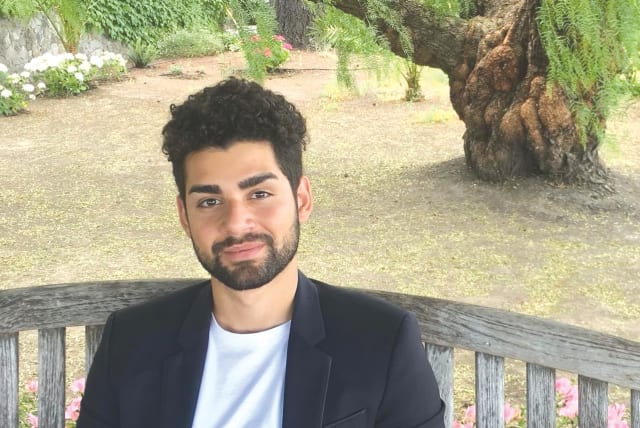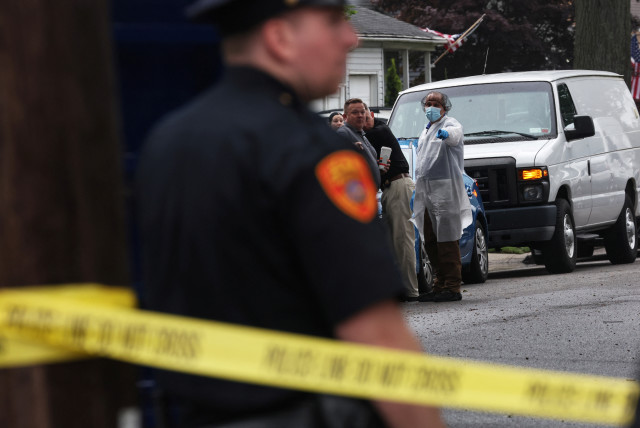Dr. Harouni's murder awoke a deep trauma for Jewish Iranians - opinion

Dr. Harouni’s murder revived communal feelings of trauma among Iranian Jews who had resettled in the United States after religious persecution in Iran.
On March 8, International Women’s Day, I hit send on an X post paying tribute to the indefatigable women of Iran.
After the brutal killing of Mahsa Amini in September 2022, young girls and women ripped off their hijabs, cut off their hair and led street protests in open defiance of a brutal theocracy that has for 45 years brutalized women, treating them as second-class citizens. Within minutes of posting, an account going by @sauce70155 commented: “Deluded k*ke. Glad that guy got your relative.”
The relative referred to here is Dr. Benjamin Harouni, a 28-year-old Jewish Iranian-American dentist who was murdered a couple of weeks ago at his family’s dental practice in El Cajon, California. The alleged killer, Mohammed Abdulkareem, was described by police as a “disgruntled” former patient, who parked his U-Haul pickup rental next to the office and burst in, spraying 23 rounds in an attack that lasted approximately one minute, wreaking irreparable damage on the Harouni family and leaving the broader Jewish-Iranian community reeling. Two other employees inside the practice, a man in his 40s and a woman in her 20s, were wounded.
“It’s devastating to see someone so hateful take someone so great in this world,” Ben’s brother Jake told me, adding that Ben exuded positivity, keen to share his love with everybody, even if it meant putting himself last.
That selfless mindset was what drove Ben to dentistry in the first place, graduating from dental school in 2022 and then following in his father’s footsteps. “Ben helped people improve their smiles on a physical level because he wanted everyone to feel confident about themselves – and that starts with a smile,” Jake said.
Despite the similarities in our surname, I am not related to Dr. Ben Harouni, although we both come from tight-knit Iranian-Jewish families that fled a repressive regime in Iran in order to live in societies that welcomed Jewish people and fostered religious freedoms and economic prosperity.
The Islamic revolution
The Islamic Revolution of 1979, and the removal of the pro-Western, secular monarchy of Shah Mohammad Reza Pahlavi, precipitated a mass exodus of Jewish Iranians. Many fled to America, with the majority settling in California. The climate in southern California, some said, was reminiscent of Tehran. Today, of the more than 500,000 people living in America with Iranian backgrounds, more than 40% live in California. Los Angeles, home to the largest Iranian community outside of Iran, is often referred to as “Tehrangeles” as a result.
Dr. Harouni’s murder revived communal feelings of trauma among Iranian Jews who had resettled in the United States after religious persecution in Iran. A group representing Iranian Jewish students at the University of Southern California, where Ben had studied, issued the following statement: “As Persian Jews, our families escaped the Islamic Republic of Iran so we, their children, could live free of religious-based violence. Yet, 45 years later in the USA, we continue to face the same ugly hatred that claimed the life of Dr. Ben Harouni. Jew-hatred has not gone away.”
The exact motivations for Ben’s murder are still being investigated, but there are growing calls by Jewish and pro-Israel organizations to investigate antisemitism as a key motive of the attack. Whether or not the attack was a hate crime is not up for dispute, according to Jake, who wrote in an Instagram post, “Those saying this was not a hate crime need to rethink what they define as hate. My brother was murdered in cold blood, yet the Internet and media want to spin the narrative around and blame this on the murderer being deranged.” He added: “As a Persian-Jewish American, I have always felt so scared and vulnerable during these times of hatred. Now that it is at my front door, it feels much more real and urgent.”
Antisemitism skyrockets since October 7
Antisemitic incidents in the United States have more than tripled in the months since the October 7 Hamas terror attacks in Israel and the war in Gaza that followed. A recent survey found that nearly a quarter of Americans harbor antisemitic beliefs.
Twenty-seven percent of Americans polled found it “at least somewhat acceptable for a close family member to support Hamas.”
Anti-Jewish hatred is reaching historic levels in Europe, too. France, the United Kingdom, Italy, and Denmark recorded all-time high levels of antisemitism in 2023. The UK government’s counter-extremism commissioner, Robin Simcox, said London has become a “no-go zone for Jews” during weekend pro-Palestinian marches. In the first week of March, a 62-year-old Parisian man wearing a kippah was attacked as he was leaving his synagogue, while an Orthodox-Jewish man in Zurich was left in life-threatening conditions after being stabbed by a 15-year-old who had expressed solidarity with the Islamic state.
At Ben’s funeral, attended in the hundreds by his loved ones and friends, his childhood rabbi said that Ben was “struck down in a senseless act of violence, in all likelihood because he was a Jew.”
Later that night at a vigil, El Cajon’s mayor, Bill Wells, reiterated that even if law enforcement attempted to obscure the true motivations for the murder, he would uncover the truth. “People have told me that they’re concerned that the city or the FBI... may try to sweep this under the rug and treat this as though it were a simple crime, [but] we will get to the truth of what happened.”
Unable to turn back time, Jake’s mission in life now is to turn his brother’s philosophy of peace and love into action.
He and his family set up a fund called “Humans Against Hate” to “support other families that have been through tragic events like ours.” Jake added: “We’re fortunate to have a community around us. Our culture-and-religion means people around us want to help, but not everybody has that support system.”
The writer is British and based in New York City. He is the author of Unveiled: Inside Iran’s #WomenLifeFreedom Revolt, a forthcoming book.
Jerusalem Post Store
`; document.getElementById("linkPremium").innerHTML = cont; var divWithLink = document.getElementById("premium-link"); if (divWithLink !== null && divWithLink !== 'undefined') { divWithLink.style.border = "solid 1px #cb0f3e"; divWithLink.style.textAlign = "center"; divWithLink.style.marginBottom = "15px"; divWithLink.style.marginTop = "15px"; divWithLink.style.width = "100%"; divWithLink.style.backgroundColor = "#122952"; divWithLink.style.color = "#ffffff"; divWithLink.style.lineHeight = "1.5"; } } (function (v, i) { });

